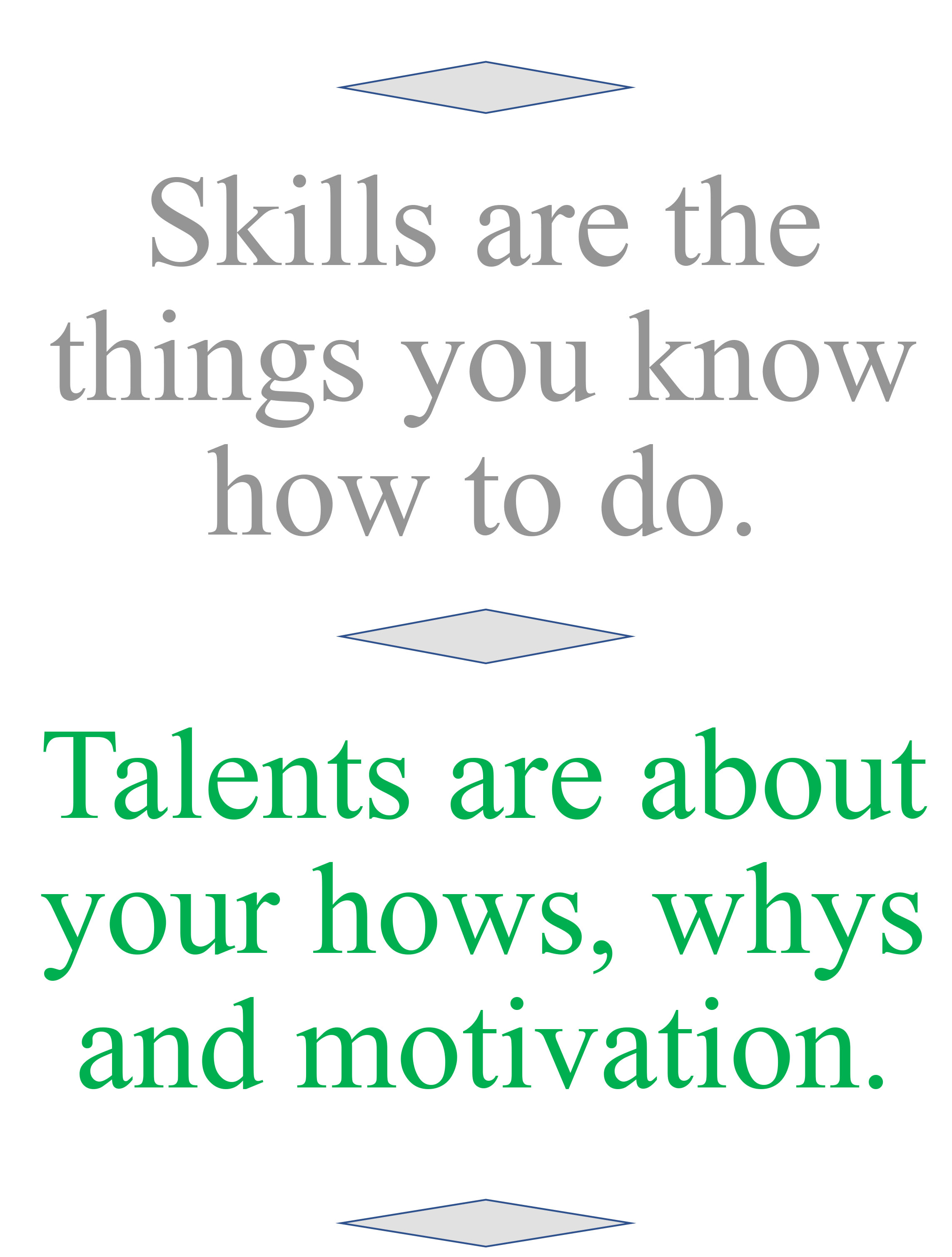Blog
Talents are Your Edge in a Job Search

Two things needed for a successful job search are a knowledge of your skills and an understanding of your talents.
Every help wanted ad lists skills deemed necessary for that job. It may require expertise with particular software or familiarity with a process or piece of equipment. Job descriptions sometimes include vague requirements about can-do attitude, hard work or being highly organized.
Skills are the things you know how to do. Skills change as you go through your work life. A skill’s value fluctuates depending on the job market, the technology and your career field. Changing careers can make skills obsolete or inconsequential. While expertise in programs like WordPerfect and Lotus 1-2-3 once indicated a timely skill set, the odds are some of you reading this article don’t even know what those once ubiquitous computer programs even were.

Skills are important. A brain surgeon obviously needs to have impressive skills. It is a good idea to only open someone’s skull if you know how to put it back together. Being current in the use of technology, computer programs, social media and the use of state-of-the-art tools can greatly contribute to success in your career.
However, there are many work skills that a reasonably competent person can figure out. That is how people have been able to go from using earlier versions of anything to the most current one. It is a blessing that knowledge builds on top of knowledge. Once we have mastered one skill, we tend to be able to use that skill to develop additional skills.
Talents are not as easily understood. Talents are about your hows, whys and motivation. “A talent is a naturally recurring pattern of thought, feeling, behavior that can be productively applied.” Talents are like an emotional and psychological GPS serving as both roadmap and routing system. They describe how you interact with the world. Depending on your talents, you will tend to relate to the world and interact with people in particular ways. For instance, your talents may have a bias towards action. In almost every situation, you want to do something about something, like completing tasks, checking things off your list, getting colleagues to come to an agreement or living up to commitments.
Identifying your talents can be tougher than knowing your skills. You can test to see how many words per minute you are able to type. You probably have a good idea how fluent your Icelandic is. But how are you going to find out what talents you bring to the table? How can you describe them to recruiters or interviewers?
Talents can be very hard to observe in yourself. Frequently they are so ingrained that you don’t realize their value or uniqueness.
Your talent can be revealed by the Clifton StrengthsFinder assessment. The assessment requires your opinion on 177 double statements indicating which of the two statements resonates the most with you. Upon completion of the assessment, you are provided with information about the talents or Strengths which represent your hows, whys and motivation. The information provided explains what the talents you possess are and what they are likely to look like in your life.
There are 34 talents. You are likely to be highly attuned to 8 to 12 of them. The reports, generated based on your answers, consist of “textbook” versions of your top talents as well as highly individualized versions, describing your talents based on how they are influenced by all of the other talents in your profile
Understanding your talents can give you an edge in the job search in several ways. More than 23 million people have taken the StrengthsFinder assessment meaning that many people are familiar with the assessment and have some knowledge of what the results mean. More importantly for you, the assessment supplies language to describe what motivates you. It also provides you with verifiable answers to questions about how you get along with your coworkers, what you bring that is unique to this potential position and how and why you are likely to succeed this new job.
Strengths, which are essentially your talents honed to their best, share a common thread with skills. Talents and skills can both be developed and improved, like an athlete who possesses a talent that is honed into a superpower by hard work and coaching. The StrengthsFinder assessment indicates your talents which you can work on and develop to the highest level. This can save you a great deal of grief by pointing out where your efforts are most likely to bear fruit and where you are likely to find long term satisfaction.
Your skills and talents both need to be understood to most effectively present yourself to potential employers. However, developing you Strengths is more likely to give you an edge in the job market than boning up on the latest edition of Microsoft whatever. Finally, talents can also help you recognize an environment in which you are likely to thrive and avoid pitfalls in your job search. If you understand your motivation and that pattern of thought, feeling and behavior, then you can productively apply them to your job search and your new position.
For help discovering and aligning with your talents, reach out to Crews Strengths LLC.
It’s Time to Put Your Strengths (talents) to Work!
Previous Posts
- “It’s Time for You to Ask the Questions!” - August 8, 2024
- What “Superpowers” are Hiding in Your Toolbox?: - May 29, 2024
- It’s Time to Put Your Strengths to Work for Your Interview – Part 4 - October 16, 2023
- It’s Time to Put Your Strengths to Work for Your Interview – Part 3 - August 21, 2023
- It’s Time to Put Your Strengths to Work for Your Interview – part 2 - July 20, 2023
- It’s Time to Put Your Strengths to Work for Your Interview - June 22, 2023
- It’s Time to Put Your References to Work - February 14, 2023
- It’s Time to Work Around Your Weaknesses - November 15, 2022
- It’s Time to Put Your Skills, Talents, Strengths (and even Weaknesses) to Work! (Once you figure out what they are). - October 13, 2022
- It’s Time to Put Your Strengths to Work: Why Hire a Coach? - August 1, 2022
- It’s Time to Put Your Strengths to Work: Rejection and the Job Search - June 25, 2022
- No One Deserves to HATE Their Job! : Your Solution to the “Great Resignation” - May 23, 2022
- It’s Time to Put Your Strengths to Work: Strengths and the Reentry Career Alliance Academy - March 3, 2022
- It’s Time to Put Your Resume to Work: Part 11. An Inventory of Your Career: Resume as Assessment - February 3, 2022
- Have Yourself a Merry Little Job Search: - November 23, 2021
- It’s Time to Put Your Resume to Work: Part 10. - October 21, 2021
- It’s Time to Put Your Resume to Work: Part 9 – Avoiding the Trash - August 25, 2021
- It’s Time to Put Your Resume to Work: Post 8. How Dressed Up Does Your Resume Need to Be? - July 20, 2021
- “It’s Time to Put Your Resume to Work” : Part 7: What to Do When You Don’t Meet All the Requirements - June 24, 2021
- “It’s Time to Put Your Resume to Work”: Part 6. Avoiding the Mundane, Boring, and Useless - May 26, 2021
- “It’s Time to Put Your Resume to Work”, Part 5 – Creating a Universal Resume (When you Don’t have All the Facts) - May 5, 2021
- “It’s Time to Put Your Resume to Work” – Part 4: Finding the Words (literally) - April 7, 2021
- BONUS – “It’s Time to Put Your Resume to Work”- Part 3a : What is the Correct Length for Your Resume? - March 25, 2021
- “It’s Time to Put Your Resume to Work”- Part 3 : The a la Carte or Customizable Resume - March 16, 2021
- It’s Time to Put Your Resume to Work – part 2 - February 9, 2021
- It’s Time to Put Your Resume to Work – part 1 - January 27, 2021
- Strengths Help You Hear the Music - October 20, 2020
- StrengthsFinder & the Ancient Philosopher - September 3, 2020
- StrengthsFinder Domains: A View of Your Strengths from 50,000 Feet - July 20, 2020
- Talents are Your Edge in a Job Search - June 25, 2020
- This Is Who You Are and That’s A Good Thing - May 22, 2020
- Introvert or Extrovert: A CliftonStrengths view - May 13, 2020
- Is It Time to Put Your “Superpowers” to Work? - April 10, 2020
- Who Are You? - April 3, 2020